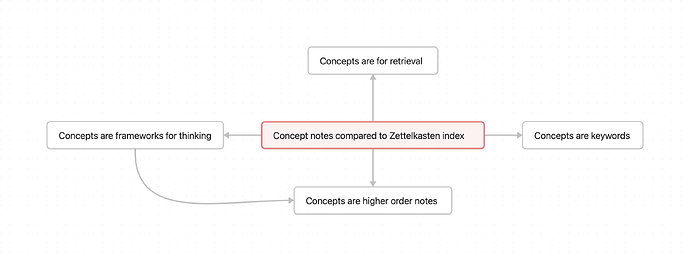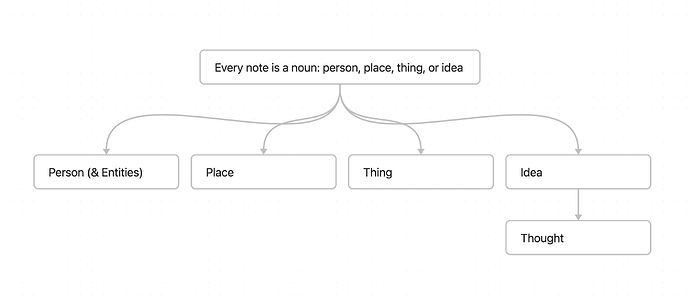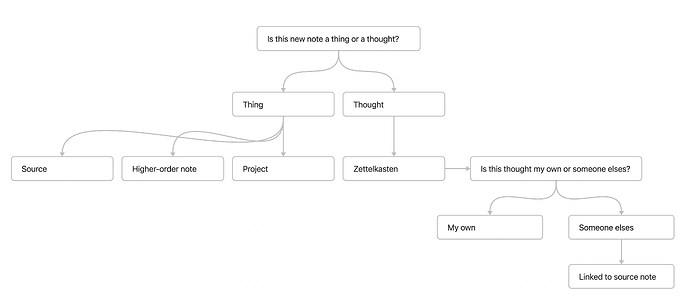Thank you all for your replies—they’ve been very helpful in refining my claim and improving my ideas. I see how my explanation was confusing.
I’ll try to clarify.
I encountered the idea of concept vs. content-based notes in this thread. The thread doesn’t clearly define the terms, and in reconsideration, I’m not particularly attached to this notion.
However, my intent remains the same:
Grounding the Discussion in Luhmann’s Ideas
I want to ground this discussion in some of Niklas Luhmann’s ideas—specifically, how he wrote his notes and how that relates to his use of an index.
I’m not an expert on Luhmann, but from what I understand, most of his notes were about specific claims rather than broad concepts. It’s unclear to what extent he used higher-order notes, but he linked multiple notes together within a single note. However, that’s not necessarily the same as higher-order notes.
Luhmann did keep an index of keywords that served as “entry points” into his system. Each keyword had 1-2 references to cards that made good entry points for that keyword, allowing him to follow references to other cards from those entry points.
Here’s a concrete example
I’ve been reading about situation awareness, a broad concept. Here are some specific claims about SA:
- SA is understanding the bigger picture while focusing on the finer details
- Dr. Mica Endsley developed the most widely cited and accepted model of SA
- The SA construct evolved under the intense pressures of aviation and is now widely applicable across disciplines
- SA is an important part of effective decision making
To avoid redundancy, information should only appear in one location unless linked. This leaves us with two options: make (1) individual notes for specific claims or (2) a single note for a broad concept.
I am suggesting that Luhmann made individual notes for specific claims.
Even the definition of a broad concept is itself a single claim that can be an individual note.
Continuing with the example, “Situation awareness” would become a keyword, and each claim would have its own note. In the index, “Situation awareness” would be listed next to 1-2 of the best entry points for this concept.
Connecting this to your comments
What others call encyclopedic notes are what I’m describing as broad concept notes. This is not to be confused with a definition note, which makes a claim about the definition of a term or concept.
Zettels are notes about specific claims, where each claim gets a separate note.
I suggest that encyclopedic notes often do not follow principles of atomicity and therefore should not be considered permanent notes. However, I understand that most people may not care to make their encyclopedic notes atomic. In that sense, do what works for you.
Retrieval of information is an important function of this kind of system. For Luhmann (and other “true Zettlers”), retrieval is a secondary function. The primary function is thinking. I believe this is an important distinction to make. Are you taking this note primarily to help you think, or to help you find information in the future? Thinking requires Zettels. Encyclopedic notes can help with the retrieval aspect.
I like your concept of the “molecular note”, especially the connection to atomic notes.
One distinction I have yet to make here is between higher-order notes and encyclopedic notes. I’m stuck on that at the moment, but maybe someone else has an idea.
I completely agree. It seems many of us are on the same page here—we’re just using different terms with slightly different approaches and principles.
In summary
What I’ve described as “broad concept notes” are commonly referred to as encyclopedic notes and are primarily useful for the collection and retrieval of information, Wikipedia-style. The nature of these notes is that they are not permanent. Zettels are atomic notes about specific claims and are permanent by nature.
I’m curious what other people think of this idea.
I realize my posts would be shorter if my ideas were clearer, but it feels like we’re making progress here.


